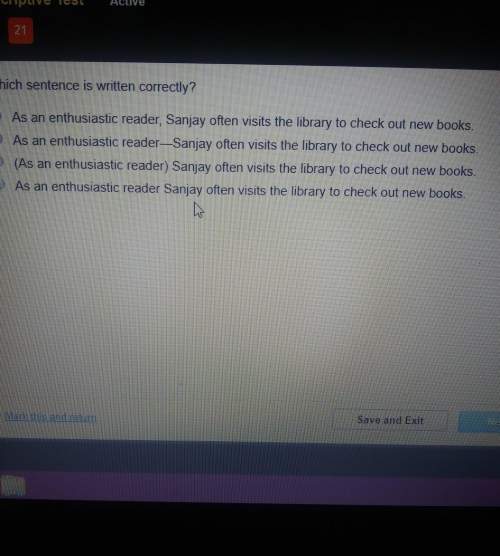
English, 23.05.2020 17:58 margaret8800
Back before I got to the age at which a person begins to develop the need to be "cool," my mom made all the clothes I wore. When I was in elementary school, I thought that the fact that she made my clothes was pretty neat. I liked having clothes that nobody else owned, and I liked being able to choose how my clothes looked. I'd walk into a fabric store, choose the patterns for the style and cut of the pants and shirts I wanted, then choose the fabric out of which my mom would make the pants and shirts. One day, I decided that I no longer wanted to wear homemade clothes. I informed my mom of my decision, and even though she had been making my clothes for years, all she said was, "Okay! When would you like to go shopping?" She was not upset by the fact that I had decided all of a sudden to change what had by then become a tradition. She was not insulted by the fact that I chose clothes that were mass-produced by strangers over the clothes that she made especially for me. We went shopping for my new clothes that evening. The clothes at the stores we shopped at came in fewer colors and styles than the clothes my mom made, but I didn't care. I was happy to be making my own decisions. I didn't care about anything else. The idea that limited choices might be a bad thing never crossed my mind. I've never had another shopping experience like that. Now, when I buy clothes, I'm never happy with how the clothes look, but I buy them anyway. When I try the clothes on, I'm reminded that the clothes I buy never fit as well as the clothes my mom made for me. When I walk outside, I see that I'm wearing the same thing as everybody else.
The reader can infer
A. that the author loves his or her mother very much. B. that the author prefers homemade clothes over store-bought clothes. C. that the author made lots of new friends after he or she got new clothes. D. that the author felt "cool" after he or she got his or her new clothes.

Answers: 2


Another question on English

English, 21.06.2019 13:40
Which statement best explains coelho's choice in the alchemist to have the boy work for the crystal merchant? it shows the reader what happens when one follows his or her personal legendit explains how the boy earns enough money to marry the merchant's daughter.it provides the reader with engaging details about the city of tangier.it demonstrates that the path to one's personal legend is not a straight and obvious one.
Answers: 3

English, 21.06.2019 23:30
4. at the conclusion of frankenstein, robert walton has an encounter with the monster, who arrives after victor frankenstein has died. perhaps surprisingly, the monster mourns his creator and expresses remorse over the fate that victor suffered. the monster pledges to destroy himself and then departs, disappearing as he goes further north. how does the monster’s behavior and attitude in this part of the novel affect the way readers view him? is he sympathetic? is he more hateful because it is only after victor has died that he relents? how does the change in the monster fit with the theme of duality in the novel?
Answers: 1

English, 22.06.2019 08:00
He contains the main idea in a paragraph. a. thesis statement b. first sentence c. declarative statement d. topic sentence
Answers: 1

English, 22.06.2019 09:10
What qualification does paul f. covington have that makes him a good fit for the position at h. t lloyd and sons?
Answers: 2
You know the right answer?
Back before I got to the age at which a person begins to develop the need to be "cool," my mom made...
Questions




Mathematics, 20.03.2020 22:59




Mathematics, 20.03.2020 22:59






Mathematics, 20.03.2020 22:59



English, 20.03.2020 22:59

Mathematics, 20.03.2020 22:59

Mathematics, 20.03.2020 22:59




